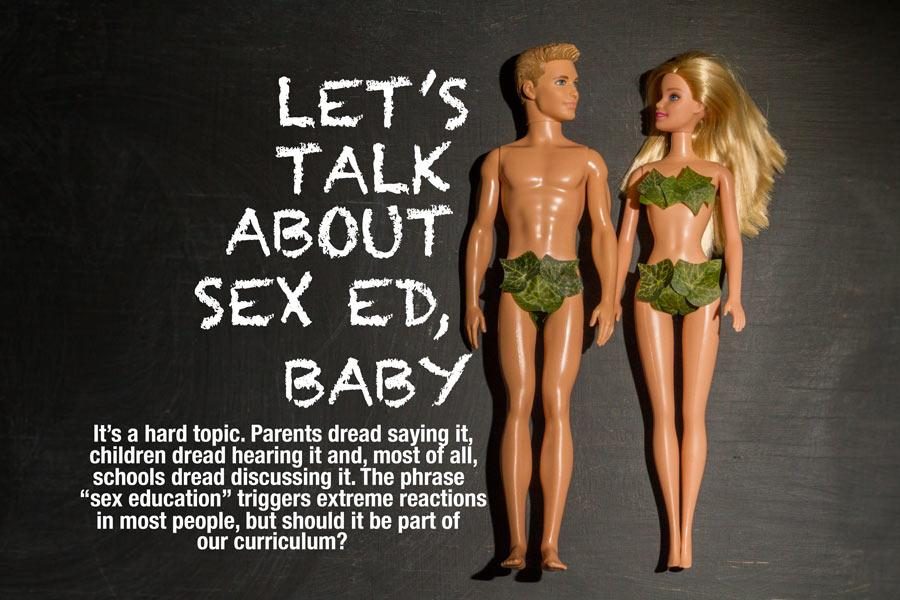Why our school is silent
TISD officials address why we lack a sex education program
Photo by Rachel Lewis
It’s a hard topic. Parents dread saying it, children dread hearing it, and most of all schools dread discussing it. The phrase “sex education” triggers extreme reactions in most people.
Many believe that abstinence should be the only option for all unmarried persons. Others embrace the reality that teenagers are having sex, and believe sex should be thoroughly explained as part of a public school education.
Meanwhile, the students are caught in the middle. Texas has the fourth highest teen pregnancy rate in the nation, which begs the question: what is wrong with the current system?
The first step to answering this question is to figure out what’s currently being taught for sex education. The answer isn’t much.
“We do not have an actual sex education curriculum,” Principal Brad Bailey said. “Our policy for the district and the state has been to promote abstinence and that’s all.”
This has not always been the case. Sex education is briefly incorporated into the curriculum for Biology I, a required course for students. It is also part of Biology II and Child Development. Those classes are not required, so many students will never take them.
All policies involving curriculum trickle down through the TISD Board of Trustees. It is their responsibility to make these kinds of decisions for all TISD schools.
“For the board to approve a sex education policy, it has to go through our School Health Advisory Council,” Superintendent Paul Norton said. “The SHAC committee determines if material is appropriate or not, and if so, what grade levels it is appropriate at.”
While there is some leeway for the Board through the SHAC, the real power is in the hands of the Texas Board of Education. Texas state law does not require sex education, but it does have strict standards for schools if they choose to provide it.
“I would point out that rather than there being a whole lot of of discretion with local school boards, that’s one area where our state legislatures have taken control,” School Board President Paul Miller said. “They laid out requirements and mandates that apply to all public education. Any public school sex education program has to be abstinence based, abstinence focused.”
This reflects the moral goals of the Texas Board of Education in encouraging all teenagers to abstain until marriage. The state is forced to try to straddle both sides of the issue. Some say that sex education must be limited to abstinence–if it is taught at all–where others say modern culture necessitates something more. Each side has its merits, but they also have serious flaws. Solving this quandary is one of the burdens falling on the state board.
According to the Center for Disease Control, Texas has the fifth highest teen pregnancy rate in the nation. It is also the leader for repeat-pregnancies. In addition, the CDC reports that an estimated 47 percent of American high schoolers have had sex at least once.
“Obviously there is room for improvement for whatever the current approach is,” Miller said. The difficult part is figuring out what kind of improvements. “There are some that would agree very strongly that abstinence based approach is the right approach. There are others that would suggest a different approach would work better.”
One of these different approaches is including sex education classes as part of the school’s mandatory curriculum. This has the benefit of ensuring all students receive a uniform, comprehensive education, but there are several consequences as well. Many believe that comprehensive sex education in schools encourages students to have sex. There is also a legitimate concern that sex education in public schools would violate the morals–particularly religious–of the community, parents and students. Many also worry that talking about sex in school would normalize it and encourage more students to have sex.
“You start getting into political viewpoints and stuff like that,” Bailey said. “I think that’s the reason why the state has remained neutral and said abstinence is the best policy. They think ‘if you don’t have sex education, then sex wouldn’t happen.’”
It is with this idea that many schools leave it entirely up to parents to teach their children as they please. This solves the aforementioned morality problem by letting parents choose exactly what their children learn. But there are several people who believe this method could put some students at a disadvantage.
“In the 21st century, it’s a parental right to be more involved with their children and having those discussions with them,” Bailey said. “We know sometimes students don’t have that parental support at home, that structure,so it’s left to the schools to help provide that parental structure.”
This is the reason why it’s so difficult for the state to set sex education standards. The issue is one of those double edged swords in which every possible choice has consequences. In the meantime, Texas High is dead in the water, and its students have to figure everything out on their own.
“Without having something in the state policy to back you, people can say ‘you taught this and I’m offended by it. I’m going to sue,’” Bailey said. “I think that’s the only reservation we have about teaching more, but I think sex education is definitely something that needs to be improved.”

Leah made a 5 on the physics AP test, but couldn't figure out how to open the door to Jessica Emerson's car even though it was unlocked. One time, she...

Rachel Lewis is a senior and is in her second year of photography. She is a staff photographer and the assignments editor. She will work hard this year...



